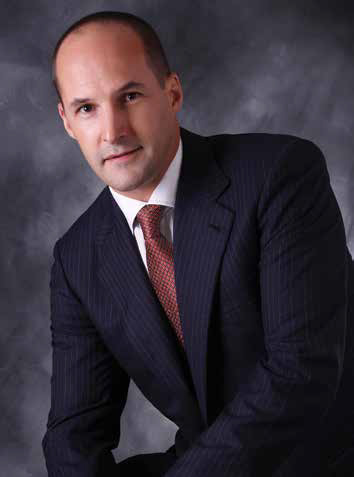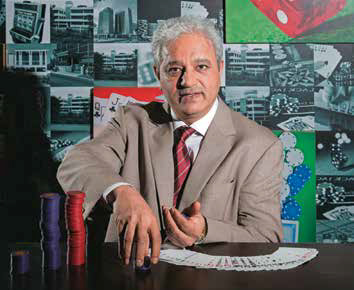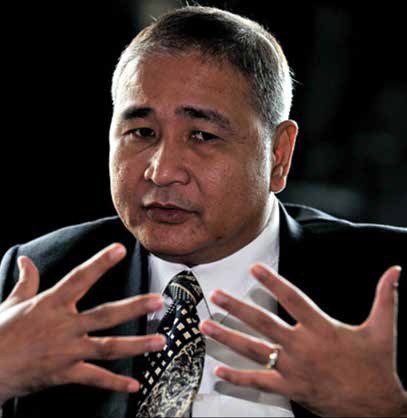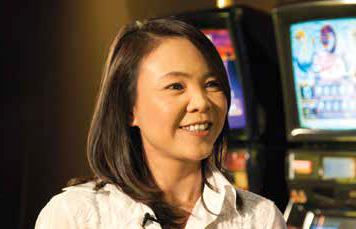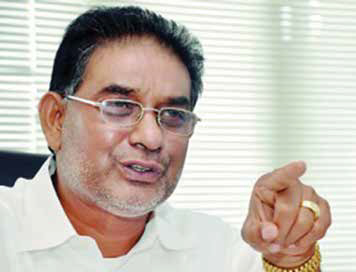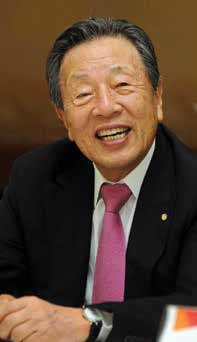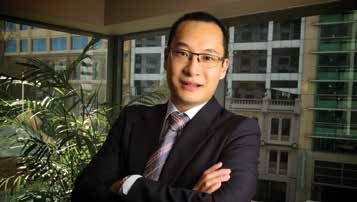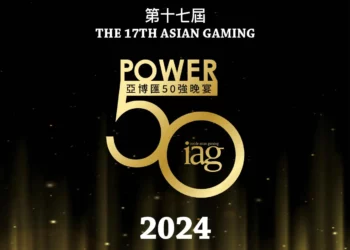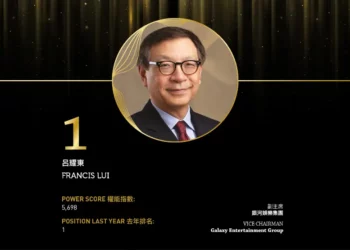41 Stephen Hung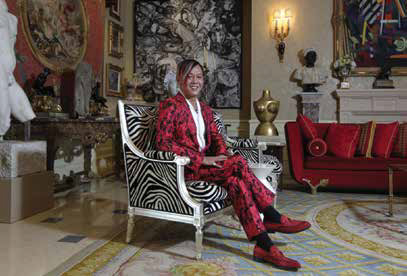
CO-Chairman and Executive Director
Louis XIII Holdings
With all of 66 table games it would look to be a difficult swim for Louis XIII in the wave of megaresorts coming to Cotai—but Stephen Hung has a flair for luxury of the over-the-top kind and a singular vision for how he’ll be bringing that to life at the boutique casino he plans to open early in 2016 at the far south end of the booming Macau resort district.
The literature says Louis XIII will be “the first of a series of ultra luxurious lifestyle experiences the Group is planning to offer the world’s wealthiest,” and Mr Hung fully expects the destination he has in mind will stand alone at the very top end of the local market, and that won’t be easy either in a market where $150,000 bets are run-ofthe- mill. But then he breathes such rarefied air in the normal course of his day and flaunts the fact with fingers and wrists that sparkle with diamonds, a fleet of Italian sports cars, a fashion model wife, a rolodex of the rich and famous and his trademark candy-colored locks.
But don’t let this obscure the fact that he’s a financier of some repute, a former vice chairman of eSun Holdings who at one time co-headed investment banking for Asia at Merrill Lynch—at 33 he founded his own firm, Amida Capital Group—and funding for Louis XIII’s HK$6.4 billion budget has been secured with an array of bigname lenders, Bank of China, China Construction Bank, Deutsche Bank and HSBC among them.
The all-important gaming license is not in hand, at least not to date, but Mr Hung has a casino operating agreement dating back to 2008 with an unnamed “concession or subconcession,” believed to be Melco Crown Entertainment. Melco has a longstanding relationship with a well-known Hong Kong construction management and services company that Louis XIII owns, Paul Y. Engineering, which has done work for Altira Macau and has had a hand in the ongoing construction of Melco’s Studio City on Cotai. Mr Hung’s connections extend to SJM as well. He’s vice chairman of Rio Entertainment Group, operator of the Rio Hotel & Casino, a sub-licensee of SJM’s on the Macau peninsula.
Senior management is in place, headed by Macau gaming veteran Walt Power as CEO, a roster that includes executives from Banyan Tree, Lan Kwai Fong Group, Keppel Land, Melco Crown and The Venetian Macao.
Additional marketing mileage is provided courtesy of Mr Hung’s “Special Advisor,” a fashion designer by the name of Tania de Bourbon Parme, “Her Royal Highness,” as she’s titled on the Web site, reputedly a descendant of the last kings of France.
Heading interior and exterior design is acclaimed New York architect Peter Marino, who’s designed flagship stores for Chanel, Louis Vuitton, Loewe, Christian Dior and Mr Hung’s friends the diamond merchants Laurence and Francois Graff, who will operate an outlet at Louis XIII.
Renderings show a swirling tower of red leaves encircling glass and crowned with a 20-meter “diamond,” a fitting package for the 238 suites and villas planned for the inside, whose offerings will include an invitation-only “Atelier” whose prices start at $1 million and the only Michelin three-star L’Ambroisie outside Paris.
42 Matt Hurst
Executive Vice President Casino Operations and Marketing
Tiger Resorts, Leisure and Entertainment
Matt Hurst brings both a wealth of Macau experience and, importantly, a reassuring presence to Kazuo Okada’s Manila Bay Resorts, the US$2 billion super-casino that is forging ahead toward a scheduled 2015 opening at Entertainment City through a gale of legal and ownership troubles the Japanese machine gaming magnate has stirred up for himself in the Philippines.
Mr Hurst likes his employer’s chances.
“The chairman is putting together a property that is truly an integrated resort that’s going to stand shoulder to shoulder with anything in Asia or the world,” he has said. “I think we’re going to be the flagship of the area. It’s going to grow the domestic market.” Plans for the 44-hectare complex are indeed expansive and include a 30,000-square-meter casino with 3,000 machines games and 500 live tables. Mr Hurst, as executive vice president – Casino Operations and Marketing for its operating company, Tiger Resort, Leisure and Entertainment, will be in charge of them all. His responsibilities range from strategic planning and development to mass and VIP marketing, advertising, branding, public relations and customer service.
He calls it his “dream job,” and his decision to pack it up in Macau and head to Luzon was an easy one, he says. Certainly he’s built an impressive career in preparation for it, dating back to the mid-’90s with a shift manager’s job at Harrah’s Sky City Auckland. He came to Macau as a senior shift manager at Sands Macao just weeks before the casino’s historic opening in May 2004, and he was at Wynn Macau for its opening two years later, serving as director of slot operations before helping to open his third resort, Melco Crown Entertainment’s City of Dreams, where he was vice president – Gaming Machines from May 2008 through November of last year and was instrumental in pioneering concepts such as floor-wide jackpots and dedicated high-limit slot areas, which are now staples of the Macau market.
43 Jaydev Mody
Chairman
Delta Corp.
India’s Delta Corp. recently launched a new brand, Deltin, under which it has placed its growing portfolio of gaming and hospitality properties in Goa and Daman.
“Rebranding our properties is an opportunity for us to complement our continued growth and expansion as an organization, plus introduce a stronger brand identity which is more descriptive of our mission, products and services,” said Jaydev Mody, 59-year-old chairman of Delta. “Our primary focus has always been on providing premium experiences as we stand for luxury and glamour at each of our properties.”
A longtime gambler, Mr Mody became chairman of Mumbai based and -traded Delta in 2008. The company holds three of the five floating casinos licenses issued in Goa and its Daman property is set to become India’s first full-fledged casino resort.
Mr Mody, a graduate of the University of Bombay, spent most of his career in real estate. Among his achievements is the development of Crossroads (now Sobo Central), Mumbai’s first world-class shopping mall. His wife, Zia Mody, is a well-known corporate attorney.
Delta’s first casino on Goa’s Mandovi River, now the Deltin Jakq, has 400 live gaming positions. In 2010, the company bought the gaming license from the owner of the Caravela and refurbished the vessel. The rebranded Deltin Caravela has 200 live gaming positions.
Delta then acquired another vessel, the Horseshoe, renamed it the Deltin Royale and built it into India’s largest gambling cruise ship, with 850 positions. Delta also owns Goa’s Deltin Empress, a luxury floating hotel, and two luxury hotels in the capital of Panaji, the Deltin Suites and the boutique Deltin Palms.
The total impact on revenues has been steadily positive since 2012, but the outlook in Goa is uncertain—Manohar Parrikar, chief minister of the state, has said he wants all gaming out of the Mandovi, and the Deltin Caravela is said to be looking for a new home.
The Deltin hotel and casino in Daman, with 176 rooms and 60,000 square feet of gaming space, received five-star certification in July and is awaiting its gaming license ahead of an expected 2015 opening. It will be India’s largest casino and the first in the country to operate outside of Goa. Delta is also said to be seeking a second site for gaming operations in Daman.
44 Dennis Valdes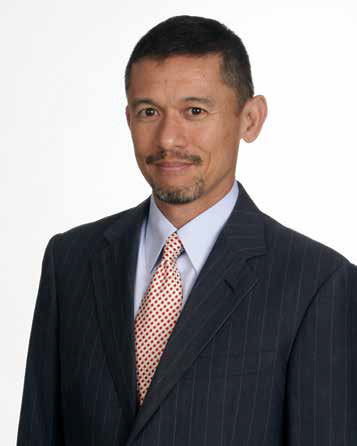
President
PhilWeb Corp.
Speaking on the sidelines of PhilWeb’s annual stockholders’ meeting last month, Dennis Valdes shrugged off the prospect of greater competition to his e-games outlets in the Philippines from the country’s new and upcoming integrated resorts.
“It’s a completely different market,” he said. “I think by now 50% of [Resorts World Manila’s and Solaire’s] revenues are coming from foreigners and the ultra-rich Filipinos, while the e-games concept is more of a 7-11 and Ministop, or a neighborhood bar.”
PhilWeb currently serves more than 40,000 customers a day via its network of online cafes, sports betting kiosks and mobile games. It operates 7,638 gaming terminals spread over 299 outlets, up from 282 a year earlier.
Although PhilWeb is essentially an Internet gaming company, Mr Valdes points out that the company needs its PAGCORlicensed land-based locations in order to function. “If you are in the e-commerce business you need to have a combination of brick-andmortar and the Internet because I don’t think that the infrastructure in our country is robust enough to be able to fully support a 100% mobile business.”
The Philippines is a difficult country to call when it comes to predicting how politics will affect the prospects of companies like PhilWeb. Proposals for outlawing Internet cafes, which have been heard for years, continue to resound among politicians and lawmakers. This is also true overseas, in Guam, for example, where PhilWeb was forced to shut down its operations in the second quarter following changes in the island’s gaming legislation. The company says it expects its Guam Sweeps outlets to reopen later this year, however, after it develops and installs new gaming products that comply with the updated regulations.
Mr Valdes told reporters last month that his company is looking at Myanmar, Palau, Nepal, Sri Lanka and Thailand as new areas of opportunity, adding, “We continue to believe that there are exciting gaming opportunities in the region, but will be more conservative as we move forward in choosing projects that are right for us.”
Regulatory risk will be ever-present as the company pursues its aggressive plan of regional expansion, though it appears to have enough irons in the fire to mitigate the fallout of negative political developments in any single jurisdiction.
45 Steven Tight
President International Development
Caesars Entertainment
Asia is likely to prove critical to the future of Caesars Entertainment as it struggles to reduce its industry-leading debt load and position itself to take full advantage of the growth opportunities that ought to be falling in the lap of the largest operator of casinos in the US.
This makes Steven Tight, president of International Development for the Las Vegas-based gaming giant, a key player in that future, moreover one whose knowledge and experience will be instrumental in shaping South Korea’s emergence onto the global resort casino stage— and quite possibly Japan’s as well.
Mr Tight’s name has been in the news a lot over the course of Caesars’ involvement in South Korea, where it will be the first international operator—so far the only one—to run a casino in Asia’s fourth-largest economy. The company famously declined to bid for a Macau concession in its former life as Harrah’s Entertainment and then failed to make the cut for one of Singapore’s two IRs. So SK is a coup for Caesars, and certainly for Mr Tight.
It’s been a harrowing ride for them both too. The company was welcomed initially as an asset to Seoul’s tourism-growth goals, only to be rejected later for reasons that were never publicized, although fears of a liquidity crisis tied to the company’s US$23 billion of debt no doubt played a part. Then at the end of last year it was invited to apply again, and in March it was approved to operate a foreigners-only casino as part of a resort complex on Yeongjong Island in partnership with Indonesian investment conglomerate Lippo and Singapore property developer OUE. The phased project is priced at US$2 billion at full build-out.
Yeongjong, which lies about 50 kilometers west of Seoul near Incheon International Airport, figures prominently in a special economic zone the government has created for the express purpose of cashing in on China’s outbound travel boom, and the entré given to the Caesars consortium is a big step for the government—“a watershed to gauge the government’s will toward the casino industry,” as one Seoul-based analyst put it to Bloomberg.
The project covers 4.3 hectares encompassing 150,000 square meters of developable floor space. Caesars wants to have the first phase open in time for the country’s hosting of the 2018 Winter Olympics and plans call for an initial expenditure of around $800 million for 500 or more hotel rooms together with entertainment venues, a shopping mall, a standalone convention center, an expansive food and beverage offering and a casino with 100 table games and 150 EGMs.
Mr Tight has promised it will be “iconic,” and prevailing opinion appears to agree. “It’s going to change the landscape of Korean casinos because it’ll be the first integrated resort-style foreigners-only casino,” said D.S. Kim, an analyst with BNP Paribas Securities Asia.
A trained architect, the 58-year-old Mr Tight has long been associated with iconic developments. He graduated from Stanford with a degree in architecture and went to work for the Walt Disney Company after taking an MBA at Harvard Business School. He stayed with Disney 17 years. He was the first managing director of Hong Kong Disneyland and was vice president of finance for Disneyland Paris. He’d risen to senior vice president of operations development at the parent company when he left in 2004 to become chief executive of Al Sharq Investment, the company behind Dubai’s $2 billion Aqua Dunya Resort. Prior to joining Caesars in 2011 he was CEO of Aquiva, a developer of luxury hotels and residences in Europe and the Middle East.
As head of International Development he’s led explorations into possible expansions of the Caesars brand into China and India and helped find the company $438 million in badly needed cash by leading it out of a moribund investment in a golf course in Macau.
In Japan, where Caesars says it’s prepared to invest $5 billion if it wins a license, he’s been talking with corporate giants of the likes of Kajima, Mitsui Fudosan and Fuji Television Network on possible tieups on an IR in Tokyo. He’s been spotted in Osaka, too, representing the company in discussions with government officials there on a similarly priced resort.
46 Cristino Naguiat
Chairman and CEO
Philippine Amusement and Gaming Corporation
Cristino Naguiat has had his hands full keeping PAGCOR competitive as it adapts to new, more challenging market conditions in the Philippines.
President Benigno Aquino handpicked Mr Naguiat, a former hospital executive, to head the government-owned casino operator/regulator in 2010. At that point, he’d served 15 years in its finance and audit departments and had the unenviable task of cleaning up his predecessor Efraim Genuino’s corruption-plagued administration.
When he took office, Resorts World Manila was already up and running in direct competition with PAGCOR’s Casino Filipino outlets, and plans were well under way for the licensing of four new integrated resorts at Entertainment City, the PAGCOR-administered district on Manila Bay designed to transform the Philippines into a major player in resort gaming in Asia. Entertainment City’s first licensee, Solaire Resort & Casino, debuted last year and is expanding. The district’s second IR, City of Dreams Manila, is slated to open later this year. Mr Naguiat forecasts Philippine gaming revenue could double to US$4.5 billion this year and reach $7 billion within the next five years, and the changing landscape finds PAGCOR moving to make its regulatory and operations responsibilities more distinct, and there has been talk of eventually exiting the operations side altogether.
Entertainment City has already presented PAGCOR with major regulatory challenges. Kazuo Okada’s US$2 billion Manila Bay Resorts complex is due to open next year, but Mr Okada is under investigation in the Philippines on bribery allegations, and some of his Philippine subsidiaries have been implicated in an alleged scheme to evade laws mandating Philippine ownership of at least 60% of all land. Those subsidiaries have twice agreed to partnerships with local companies to satisfy the requirement only to have them fall apart. The latest one is in litigation, and the subsidiaries currently are under a court order enjoining them from negotiating with new partners.
PAGCOR has remained adamant that Manila Bay Resorts cannot open without resolution of the ownership issue. The word has come, repeatedly, from Mr Naguiat himself. “Even if they finished it, they still cannot open it if they do not have a local partner. Before opening, they should abide by all Philippine laws,” he told a local newspaper in June.
Mr Naguiat is also facing challenges from the government’s Bureau of Internal Revenue, which won a Supreme Court ruling last year subjecting PAGCOR and the private casinos it licenses to corporate income tax of 30%. PAGCOR had previously been exempt and had negotiated its license fees—effectively the gaming tax rate—with private operators on that basis. The BIR ruling gave ammunition to skeptics who branded PAGCOR and the Philippines unreliable. But from the outset, PAGCOR promised to mitigate the impact of the ruling, and in May it delivered, reaching a deal with the Entertainment City licensees that cut their fees on gaming revenue by 10 percentage points—to 5% for VIP play and 17% for mass market. It was a stellar save for PAGCOR’s credibility. PAGCOR has also repaid more than half of US$140 million in back taxes and dividends owed to the government by the Genuino administration.
Finding a formula to revive PAGCOR’s fortunes on the operating side is proving more difficult. In July, the competition from Resorts World Manila forced it to shutter its Casino Filipino outlet near the airport, its second casino closing in the capital in 15 months. PAGCOR’s casino revenue fell nearly 10% last year, while the country’s private operators grew theirs by nearly 20%. Nationally, total gaming revenue grew 8.5% in peso terms in 2013, but PAGCOR’s share of it shrank from 41% to 35%.
This year, PAGCOR’s first-half revenues dipped to PHP19.96 billion (US$455 million), compared to PHP21.06 billion in the same period a year earlier, and the company missed its net income target by 14%. Gaming revenue actually improved slightly (+1.1% year on year) but fell shy of the company’s forecast by 6.1%.
PAGCOR remains a major revenue generator for the Philippine government and beat H1 2013’s PHP9.1 billion contribution to state coffers with PHP10.5 billion through the first six months of 2014. The government is expecting 14 billion this year and the same next year. Faced with City of Dreams Manila, an energized Solaire and an expanding Resorts World Manila, it will take everything Mr Naguiat has to meet it.
47 Constance Hsu
General Manager
Altira Macau
Beyond City of Dreams, Melco Crown Entertainment’s other operations in Macau—the VIP-centric Altira Macau and the Mocha Clubs chain of slot parlors—are in decline. But that’s down more to marketplace dynamics than the abilities of Constance Hsu, who was appointed to head the former in December, after having led the latter since 2008.
Net revenue at Altira Macau was US$181.6 million in Q2 2014, down 35% from the year-ago quarter. The property suffers from an isolated location on Taipa, occupying a no-man’s-land of sorts between the peninsula gaming hub consisting of MGM Macau, StarWorld, Wynn Macau and Grand Lisboa, and the Cotai resort district where The Venetian, Galaxy Macau and City of Dreams lie. Altira has been particularly hard-hit by the citywide slowdown in VIP gaming revenue, and its second-quarter performance was also adversely affected by bad luck, with a VIP rolling chip win rate of 2.7% versus 3% in Q2 2013. Rolling chip volume was $8.3 billion in the second quarter, down 30% year on year. For a property with little main-floor appeal, mass-market drop was, however, up 14% year on year in Q2, benefiting from rising visitation to Macau.
Over at Mocha Clubs, meanwhile, net revenue was $36.5 million in the second quarter, down 2% year on year. That’s a creditable performance, though, considering the number of gaming machines in operation across Mocha Clubs’ venues averaged approximately 1,200 in the quarter compared to around 2,000 in the comparable year-ago period, and implies a soaring net win per machine per day of $331 versus $207 in Q2 2013.
Mocha Clubs has had to scale back in line with government regulations forcing slot parlors out of residential neighborhoods. The fact that the chain of coffee shop-style slot parlors has registered only a 2% decline in revenue after losing one-third of its machine count and in the face of intensifying competition from the slot floors of the city’s glitzy casinos is a testament to the yeoman job Ms Hsu did in positioning the operation to compete in a rapidly developing market prior to her departure in December.
Ms Hsu had been with Mocha since it began in 2003, starting out as a financial controller and rising through management ranks quickly to become chief administrative officer. There, she oversaw finance, treasury, audit, legal compliance, procurement and human resources. In 2008, she was named president of Mocha, becoming one of only a handful of women to rise to the executive ranks in Macau’s gaming industry.
It’s early days for Ms Hsu at Altira, and market dynamics are working against her, with the property set to become even more locationally disadvantaged as the second wave of megaresorts begins to open on Cotai come next year. Still, her new job is clearly a vote of confidence from Melco Crown in her track record of instilling in an operation the necessary focus on customer service and familiarity with local preferences to stand firm in the face of adversity.
48 Ravi Wijeratne
Chairman
Rank Holdings (Pvt) Ltd
Crown Resorts and its Sri Lanka partner Ravi Wijeratne want to develop a US$350 million resort casino in the capital of Colombo. The government loves the idea. But political opposition to the terms of the deal, coupled with the hostility of the island nation’s influential Buddhist clergy, self-appointed guardians of its morals, has forced the administration of President Mahinda Rajapaksa to tone down its support, and construction has yet to start. Mr Rajapaksa is expected
to seek a third term in elections that could be held as soon as January, and it’s not likely that Crown Colombo, as it’s called, will break ground before then.
The 36-story, 400-room complex is slated to be built on a lakeside plot in the capital’s tourist core, and as owner of two of the country’s five officially recognized casinos (none are actually licensed), Mr Wijeratne is its key. The target market is “rich Indians,” as he puts it, big spenders who might otherwise go to Macau or Singapore to gamble. “We plan to divert them to Colombo, which is nearer to their homes,” he says. The potential is huge and still untapped. By his estimation, most of Sri Lanka’s foreign players come from China and Singapore, with India’s contribution “barely 2%”.
He is keen to point out also that it was he who brought James Packer to Sri Lanka. “The government is not responsible in any manner for James Packer’s involvement in the project,” he said in a recent interview. “My board of directors discussed what international company should undertake the management of the hotel. I visited several countries and met the business community. I realized that there was no match for James Packer. It was I who selected him and not the government.”
Mr Wijeratne, one of Sri Lanka’s pre-eminent entrepreneurs, returned to the island in 1992 after completing his education in the UK. He’s built up a diversified portfolio of businesses under his flagship, Rank Holdings, but the civil war that raged in the north of the country until 2010 forced him to put on hold his ambition to expand it with world-class hospitality offerings. Now that peace reigns, he is aggressively pushing ahead.
The government sees foreign tourism as a key element in Sri Lanka’s post-war economic future and has approved two other major resort casino projects for Colombo—the US$350 million Queensbury proposed by Sri Lanka’s Vallibel One conglomerate and an $850 million complex spearheaded by regional hospitality giant John Keells Holdings, the country’s largest publicly traded company.
49 Han Chang-woo
Chairman and CEO
Maruhan Group
Japan’s massive pachinko industry is in decline. According to investment bank Morgan Stanley, gross revenue from the country’s primary speculative pastime—a form of quasi-gambling played on pinball-style machines—has shrunk to 19 trillion yen (US$185.8 billion) from 31 trillion yen two decades ago, while the number of players halved between 2002 and 2012. Major factors driving the decline include the country’s shrinking population and pachinko’s failure to attract younger players, who prefer games on their mobile phones.
Most of Japan’s 12,300 pachinko parlors are managed by small, family-run outfits, with Maruhan Group and Dynam Holdings the giants among the 4,000-plus operators. Maruhan is the biggest earner, generating the equivalent of $20.1 billion in sales across 299 venues in the 12 months ended 31st March. Although the entire industry is hurting, Maruhan and Dynam are doing better than the smaller companies, with Maruhan’s sales down just 1.2% over the previous year. Maruhan and Dynam are also working to reverse the decline with improved venues and a greater emphasis on customer service.
The estimated $2.7 billion fortune of Maruhan’s self-made founder, Korean-born Han Chang-woo, landed him in 12th place this year on Forbes’ “Japan’s 50 Richest” list, emblematic of an industry which owing to its disrepute among Japan’s commercial elite is dominated by ethnic Koreans, especially on the operations side. Maruhan was set up in 1953 and incorporated in 1957. As Japan prospered in the post- World War II era, pachinko also thrived, and Mr Han did well enough in the ’60s to diversify into bowling alleys, driving ranges for golfers, amusement facilities, cinemas and other leisure-related businesses. In the 1970s, he returned his focus to pachinko and rode the wave of the country’s ’80s economic boom, which left him well-positioned to take advantage of the long slide that followed, when he continued to build the company by exploiting the decline in asset prices to increase Maruhan’s market share.
Mr Han, now 83, has expanded his reach into more centralized locations. He’s built multi-story emporiums that lure customers with innovations that include non-smoking sections, free parking and improved odds. The cash flow from these large, successful outlets has helped transform Maruhan into the conglomerate it is today. The company’s Maruhan Japan Bank subsidiary has been expanding in Cambodia, Myanmar and Laos. And as pachinko sales slow, Mr Han is focusing more on new developments, including a four-story building in Osaka to open this year that will consist of shops and restaurants selling goods from South Korea, as well as a concert hall for Korean performers. According to Forbes, the Osaka development is part of his efforts to solidify relations between Korea and Japan.
50 Joey Lim
Managing Director and CEO
Donaco International
In Donaco International, Asian gaming has a new player— small, nimble, opportunistic and gifted by way of 36-year-old CEO Joey Lim with a stellar pedigree.
Mr Lim’s uncle is Genting Group Chairman Lim Kok Thay and Sydney-based Donaco went public on the Australian Stock Exchange in its current form in February 2013 with the Lim family in control of 51.5% of the shares and a focus on pursuing niche casino projects, “boutique,” as the company describes them, principally in Southeast Asia.
Mr Lim was all of 24 and not long out of university with a computer science degree when he founded Donaco as a mobile technologies provider in partnership with his legendary grandfather, Genting founder Lim Goh Tong. But like his grandfather and his uncle he was quick to size up the potential of Asia’s underserved gaming markets, and early in 2003, within months of Donaco’s founding, he opened the 34-room Lao Cai International Hotel in northern Vietnam on the border of China’s Yunnan province.
Donaco has since moved to spin off the tech business, and in the last year raised A$100 million from two share sales, and in May, the company signaled its arrival with the debut of the Lao Cai’s A$57 million, 400-room successor, the Aristo International Hotel.
Aristo is equipped to take even more of an outsized share of Vietnam’s US$300 million foreigners-only gaming market than its predecessor. It houses 40 live table games—up from the Lao Cai’s eight, and it’s licensed for up to 10 more—and the results are already in evidence. Visitation is up more than 40% year on year, nearly all from China, and VIP play, which generates about 80% of gaming revenue thanks to partnerships with some 40 junket operators, was up 74% in June and July. Slot revenue has been robust, too, up 144% for the year ended 30th June, likewise due in large part to Aristo’s more expansive offering, and plans are to increase the EGM inventory from its current 58. Its license allows as many as 300.
Mr Lim also likes his chances should the Vietnamese government open the domestic market, a possibility that looks increasingly likely. There isn’t another casino in the country closer than 450 kilometers and a new highway designed to link Lao Cai province with Hanoi is scheduled for completion the end of this year.
Donaco, in the meantime, has amassed A$98 million in cash, debt is minimal at around $6.7 million, and as Mr Lim puts it, a “strong pipeline of potential deals” is in place







